-

新人教版高中英语必修2Unit 3 The Internet-Discovering Useful Structure教案一
This unit is about the Internet, which has a great influence to our humans and our lives. During the Listening & Speaking & Talking and Reading and Thinking section, the influence in examples has been shown. Thus, use the Present Perfect Tense is appropriate. However, in order to show the justice or weaken the doer of the behavior/action, it’s better to use the Present Perfect Passive Voice than the Present Perfect Tense. Besides, having learned to use the Present Perfect Passive Voice, students can beautify their language in their writing. 1. Learn the structure of the Present Perfect Passive Voice and its functions. 2. Learn to change the sentences with the Present Perfect Passive Voice into the sentences with the Present Perfect Passive Voice. 3. Learn to write sentences with the Present Perfect Passive Voice flexibly according to the context. 1. Learn the structure of the Present Perfect Passive Voice and its functions. 2. Learn to change the sentences with the Present Perfect Passive Voice into the sentences with the Present Perfect Passive Voice. 3. Learn to write sentences with the Present Perfect Passive Voice flexibly according to the context. Step 1 Observe the following sentences, then change the sentences into passive voice.He has been selected to take part in the sports meeting.(肯定句)他已被挑选出来参加运动会。The ink has not been removed from his overcoat.(否定句)墨迹还没有从他外套上去掉。

新人教版高中英语必修2Unit 3 The Internet-Reading and Thinking教案二
Q5:What's Jan's next goal?Her next goal is to start a charity website to raise money for children in poor countries.Q6:What can we learn from her experiences?We learn that when we go through tough times, we can find help and support from other people online. We learn that we can feel less lonelyStep 5: While reading---rethinkingQ1: What is Jan’s attitude to the Internet ?Thankful/Grateful, because it has changed her and her life.Q2: What writing skills is used in the article ?Examples(Jan’s example, the 59-year-old man’s and the 61-year-old woman’s example)Q3: Can you get the main idea of the article ?The Internet has changed Jan’s life/Jan’s life has been changed by the Internet.Step 6 Post reading---Retell the storyMuch has been written about the wonders of the World Wide Web. There are countless articles (1)telling(tell) us how the Internet has made our lives more convenient. But the Internet has done a lot (2)more(much) for people than simply make life more convenient. People’s lives (3) have been changed(change) by online communities and social networks so far. Take Jan for example, who developed a serious illness that made her (4)stuck(stick) at home with only her computer to keep (5)her(she) company. She joined an online group (6)where she could share problems, support and advice with others. She considered the ability to remove the distance between people as one of the greatest (7)benefits(benefit). She was so inspired (8)that she started an IT club in which many people have been helped. She has started to learn more about how to use the Internet to make society better. Her next goal is to start a charity website to raise money (9)for children in poor countries. Jan’s life has been (10)greatly(great) improved by the Internet.

新人教版高中英语必修2Unit 4 History and Traditions-Listening&Speaking&Talking教案一
This unit is about history and traditions. From the opening page, we can know that this unit will introduce the history and traditions around the world. As Marcus Garvey says “A people without the knowledge of their past history, origin and culture is like a tree without roots”, it is important for students to realize the importance and value of knowing the history and traditions and their further meanings. And this part ( listening and speaking ) is divided into two parts: Part A---share views on historic sites, Part B ---talk about a visit to a historic tourist destination. By talking with a foreigner, the speakers introduce the historic attractions and their cultures. Part A is that William, a British student, who was going to visit the Confucius Temple and a Chinese student, Xiao Kong, who was going to the Confucius Temple to meet with the members of the research group, went together and exchanged their views on the Confucius Temple, Confucius, Confucius' descendants and Confucius' educational thoughts. Part B is a conversation between Xiao Yan, a youth hostel receptionist and Paul, a backpacker about the feelings and experience after visiting the Chinese famous tourist attraction Pingyao.1. Guide students to understand the content of listening texts in terms of the whole and key details; 2. Cultivate students' ability to guess the meaning of words in listening; discuss with their peers how to talk about historic spots and great person.3. Instruct students to use functional sentences of showing one’s excitement, surprise and disappointment.1. Guide students to understand the content of listening texts in terms of the whole and key details; 2. Cultivate students' ability to discuss with their peers the related topics.3. Enable students to use the functional items of showing one’s excitement, surprise and disappointment.

新人教版高中英语必修2Unit 4 History and Traditions-Discovering Useful Structure教案二
This teaching period mainly deals with grammar: The past participle is used as attributive and objective complement.1. Guide students to review the basic usages of the past participle used as attributive and objective complement.2. Lead students to learn to use some special cases concerning the past participle used as attributive and objective complement flexibly.3. Strengthen students’ great interest in grammar learning.1. Help students to appreciate the function of the past participle used as attributive and objective complement.2. Instruct students to write essays using the past participle used as attributive and objective complement.Step1:温故而知新。Analyze the underlined phrases and then sum up the common usages of the past participles.1.(教材P41)They had castles built(build) all around England, and made changes to the legal system.2.(教材P42)They use the same flag, known(know) as the Union Jack,...3.(教材P42)Judy and I had our car parked(park) in an underground car park near Trafalgar Square, where we could get our car battery charged(charge).Common points: f the past participle used as attributive and objective complement.Step 2:过去分词作定语时的意义1.及物动词的过去分词作定语,在语态上表示被动;在时间上,常表示动作已经发生或完成,有时也不表示时间性。Our teacher watched us doing the experiment and gave us a satisfied smile at last.我们的老师看着我们做实验,最后给了我们一个满意的微笑。The plan put forward at the meeting will be carried out soon.会上提出的计划将很快被执行。2.不及物动词的过去分词作定语,它不表示被动意义,只强调动作完成。Many little kids like gathering fallen leaves in the yard.

新人教版高中英语必修2Unit 4 History and Traditions-Reading and Thinking教案一
Features of languages1.Finally, in the 20th century, the southern part of Ireland broke away from the UK, which resulted in the full name we have today: the United Kingdom of Great Britain and Northern Ireland.该句是一个复合句。该句主句为:the southern part of Ireland broke away from the UK;which resulted in the full name we have today为which引导的定语从句代指前面整句话的内容,we have today为定语从句修饰先行词name。译文:最后,在20世纪,爱尔兰南部脱离英国,这导致了我们今天有的英国的全名:大不列颠及北爱尔兰联合王国。2.Almost everywhere you go in the UK, you will be surrounded by evidence of four different groups of people who took over at different times throughout history.该句是一个复合句。该句主句为:you will be surrounded by evidence of four different groups of people;其中Almost everywhere you go in the UK为让步状语从句; who took over at different times throughout history为定语从句修饰先行词people。译文:几乎无论你走到英国的任何地方,你都会发现历史上有四种不同的人在不同的时期统治过英国。3.The capital city London is a great place to start, as it is an ancient port city that has a history dating all the way back to Roman times.该句是一个复合句。该句主句为:The capital city London is a great place to start; as it is an ancient port city that has a history dating all the way back to Roman times.为原因状语从句;dating all the way back to Roman times为现在分词短语作定语修饰history。

新人教版高中英语必修2Unit 5 Music-Discovering Useful Structures教案二
4. When he got absorbed in his world of music, he felt as if he could “see” the beauty of the world around him, like he had in his previous life.P·P as adverbial: _________________________________________________________________.Function: _______________________________________________________________________.Step 5 Solid Complete the passage with the words in brackets in their correct forms.Well known as a successful band, the Impact members show quite a few striking qualities. They never ever give up. When _____________(question) by the media, they are not _____________(discourage) and practise even harder. They are improving themselves by attending several master training class. They are united. _____________(fill with) team spirit, they act as a whole, always aiming for glory. Step 6 Difference and similarity from -ingObserve the following examples.1. He went out, shutting the door behind him.=He went out, ________________________________________________________.2. Not knowing what to do, he went to his parents for help.=__________________________________________, he went to his parents for help.Similarity: _______________________________________________________________________________________________________________________________________________________.Difference : _______________________________________________________________________________________________________________________________________________________.Step Practice1. ________ in a hurry, this article was not so good. 因为写得匆忙, 这篇文章不是很好。2. ________ carefully, he found something he hadn’t known before. 他仔细读书时, 发现了一些从前不知道的东西。3. ________ why he did it, the monitor said it was his duty. 当被问及他为什么要这么做时, 班长说这是他的职责

新人教版高中英语必修2Unit 5 Music-Listening and Speaking教案
This lesson is about music. Students can classify the types of music through the instruments and its sound and can talk about their preferences about music, even join some activities and play a role in them according to their musical talents. On the basis, they are guided to use the languages to express their preferences and some plosive sounds and their rules.1. Classify the music types through the instruments and its sound.2. Listen and understand what the speakers’ preferences are and the reasons; talk about their own preferences and give their own reasons, using these sentences: “What kind of music do you like? And why? “ “Because it makes/gives me energy/peaceful.../touches my heart...”.3. Learn some plosives and the rules.4. Join some activities and play a role in them according to the talents. 1. Listen and understand what the speakers’ preferences are and the reasons;2. talk about their own preferences and give their own reasons, using these sentences: “What kind of music do you like? And why? “ “Because it makes/gives me energy/peaceful.../touches my heart...”.3. Learn some plosives and incomplete plosives and its rules.Step 1 Lead inPoint at the pictures on P50 and ask Q1: What are the people doing in the pictures below?Q2: What kind of music they are?Then play the MP3s one by oneStep 2 ListeningTask 1: A reporter from the school newspaper is interviewing students about music. Listen to the interviews. Draw lines between the words to make complete sentences. Some words will not be used.

新人教版高中英语必修2Unit 5 Music-Reading for Writing教案二
The Internet celebrity Gao Yifeng. Years ago, he owned 5 companies and the staffs over 1,000, but during the economy crisis, he became nothing but debt. He was so worried that his hair became white overnight. There was a time when he wanted to killed himself. But after listening to the song Start Over by Liu Huan, he decided to cheer himself up. He started a steamed bun shop and gradually became a national chain shops. Now he became successful again.Walter Haddon said, “Music is the medicine of a troubled mind.” Music contains such a pleasant and inspiring force. Music gave him courage and bravery. When he listened to the song, it made his spirit fly like a kite in the wind. Music gave him strength and brought him relief. It was the rock I leant on to become strong and to get through those hard times. I hope none of us have to go through the same kind of suffering that he did. At the same time, we all go through various periods when we feel sad or alone. During those times, music can help us in the same way that it helped him. I hope we all will somehow begin to treasure music and make it a part of our life. Thank you for your listening !5.Revise your writing each other.Does he/she explain how music has changed his/her/someone else’s life?Are some of the rhetorical devices included and used properly ?Does he/she talk about how music makes him/her/someone feel?Is the first word in each sentences capitalised?Does he/she use correct punctuation ?
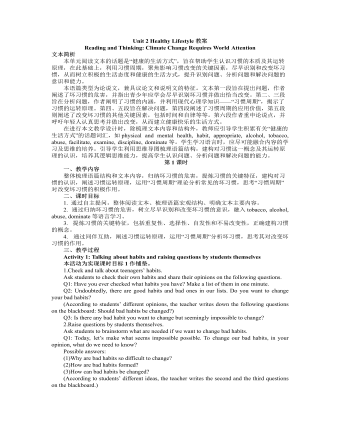
新人教版高中英语选修3Unit 2 Healthy Lifestyle教案
Activity 4: Figuring out the structure and the writing purpose 本活动为实现课时目标2。 1.Read Paragraph 6 and think about its main idea and the writer’s writing purpose. Q1: If you were the author, how would you end your article? “For young people, there is plenty of time to change bad habits. However, there is no “magic pill” or delete button that will help you; you have to think about your bad habits and decide on some changes. You have the power to build a happy and healthy life full of good habits!” Q2: What is Paragraph 6 mainly about? (Possible answer: to appeal to young people including teenagers to change bad habits and live a happy and healthy life.) 2.Think about the writer’s writing purpose and share opinions. Q1: What is the writing purpose? Work in pairs and figure it out. (Possible answer: On the one hand, the passage is written to help teenagers change their bad habits and live a healthy lifestyle. On the other hand, it provides us with a scientific way to identify and analyse our problems objectively, thus strengthening our resolve to tackle the seemingly common yet tough problems in our lives.) 【设计意图】 步骤1旨在预测和验证文章最后一段主要内容,梳理完整的语篇结构,步骤2旨在思考和讨论作者的写作目的。教师也可根据学生课堂反应情况融入对语篇人称多次转换的思考。
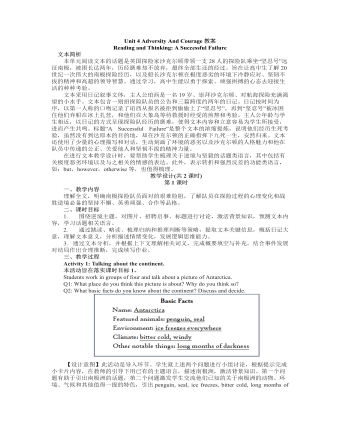
新人教版高中英语选修3Unit 4 Adversity And Courage教案
本活动旨在落实课时目标3。 The Student Union is looking for three students for a 3-week voluntary program in Guizhou province. The volunteers have got to be high school students, with a persevering personality and experiences in overcoming adversity. The volunteers need to stay, eat and teach with 20 pupils in a small school up on the hill of a village. There are no facilities but desks and a blackboard in the school. And there is no take-away food to be bought anywhere; the only way to feed yourself is to cook. You’re interested in applying. Write your application letter introducing what adversity you have ever overcome and how persevering you are as well as what you want to do when at work. Dear Student Union,【设计意图】此任务旨在迁移一、二课时所学,解决实际问题。学生对比自己经历过的挑战或挫折,写信给学生会申请前往贵州担任短期支教教师,把个人以前是怎么战胜挫折的经过书写出来。结合所学,迁移创新,分析解决自身实际问题,在真实情境中学生通过仿写进行主题语言的精确输出。完成任务的过程中,能较多地使用已学语言、内容、结构和写作手法来描述自己面对挫折的处理方式、态度和应有的品质,近一步激发学生树立正确的价值观,学会逆境出人才,坚忍不拔,从容不迫,又做到谦让、分享和合作。课后学生修正习作,再次提交。
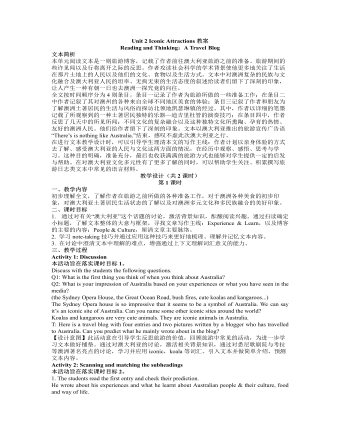
新人教版高中英语选修4Unit 2 Iconic Attractions教案
帮助学生通过讨论与对主题的提升,反思自己的旅游方式,以便做出更优化的安排,在今后的旅程中有更多的收益。 Activity 2: Further discussion of the 6 elements above and supplement of more background knowledge 本活动为实现课时教学目标2。 1.Target Q: The writer’s clear target of traveling, meeting the people and experiencing the culture, is closely related to his major in social studies. Then what is social studies? Social studies is a part of a school or college curriculum concerned with the study of social relationships and the functioning of society and usually made up of courses in history, government, economics, civics, sociology, geography, and anthropology. (Dictionary by Merriam-Webster) Reflection: When you go out to travel, what targets do you usually have in mind? 2.Research Q: Suppose you are traveling to Hangzhou during the school holidays, how will you do research on the city? (surf the internet, read books or travel brochures, consult friends, ...) What information will you be interested to know? (location, iconic sites, local cuisines, interesting customs, shopping malls ...) 3.Abandonment To make the most of time, we have to learn to abandon so that we can accomplish our plan. What will you be interested in doing if you go to Hangzhou if you have a week’s time? What if you only have 2 days? 4~5. Venturing & Experiencing Q: What did he venture to do during the trip? What new experiences did he have? In Sydney: attend his first open-air barbecue, enjoy many different but yummy meals In Catherine: observe the life and customs of the aborigines appreciate their music & try the musical instruments: the didgeridoo
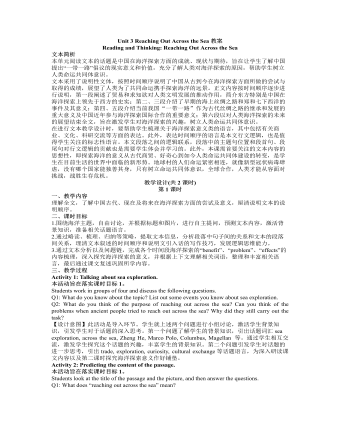
新人教版高中英语选修4Unit 3 Reaching Out Across the Sea教案
本活动旨在落实课时目标3。 Think about the following questions and talk about your own attitude in pairs.Q1: As for this topic,what impresses you the most in the passage?Q2: What do you think of the future of China’s further exploration in sea? Are you in favor of the further exploration?Why or why not? 【设计意图】该活动是一个完全开放性的活动,每个学生都会有不同的答案。运用迁移所学,自由口头表达自己对海洋探索的态度。对于中国海洋探索的未来,每个人的想法是不一样的,有乐观,有担忧,有认为值得投入,也有认为不值得付出太大代价,这里给学生自由表达的空间只要学会有支撑自己观点的事实就可以了,进一步培养学生批判性思维和正确的价值观。 Assignment: 此任务旨在迁移一、二课时所学,培养学生辩证分析问题的能力。 Write about your idea of the future of China’s sea exploration. And add your attitude towards the effort China have made in sea exploration. You’re expected to use the language and the writing technique learnt in the passage.
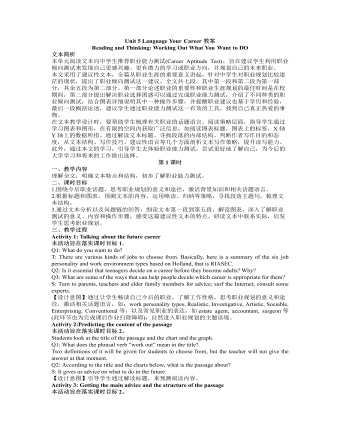
新人教版高中英语选修4Unit 5 Language Your Career教案
本单元阅读文本向中学生推荐职业能力测试(Career Aptitude Test),旨在建议学生利用职业倾向测试来发现自己更感兴趣、更有潜力的学习或职业方向,并规划自己的未来职业。 本文采用了建议性文本,全篇从职业生涯的重要意义讲起,针对中学生对职业规划比较迷茫的现状,提出了职业倾向测试这一建议。全文共七段,其中第一段和第二段为第一部分,其余五段为第二部分。第一部分论述职业的重要性和职业生涯规划的最佳时间是在校期间,第二部分提出解决职业选择困惑可以通过完成职业能力测试,介绍了不同种类的职业倾向测试,结合图表详细说明其中一种操作步骤,并提醒职业建议也基于学历和经验,最后一段概括论述,建议学生通过职业能力测试这一有效的工具,找到自己真正热爱的事物。 在文本教学设计时,要帮助学生梳理有关职业的话题语言。阅读策略层面,指导学生通过学习图表和图形,在有限的空间内获取广泛信息,如阅读图表标题,图表上的标签,X轴Y轴上的数据所指。
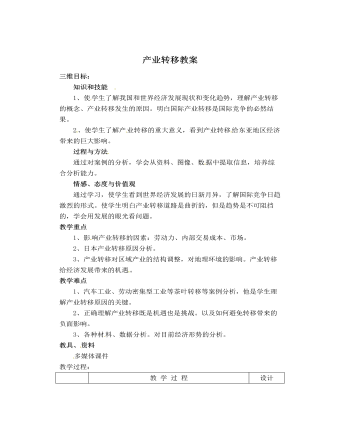
人教版高中地理必修3产业转移教案
1.国家石油价格上涨,导致依赖于国际石油而建立起来的日本重化工业的制造成本提高,产品价格相应提高,削弱了日本重化工产品在国际市场上的竞争力。2.日元 的大幅度升值,意味着日本产品在国际市场上的价格大幅度提高。例如,同样的日本产品,如果原来在国际市场上卖1美元,日元升值1倍后其在国际市场上的售价就达2美元。所以,以国际市场为依托的日本传统产业只好纷纷向海外转移。3.自身市场满足不了发展需求,国际市场上亚洲发展中国家和地区的同类产品具有明显的价格优势。所以,日本企业在其国内发展的空间很小。4.劳动力价格高反映为产品的价格高,而劳动力数量又满足 不了企业进一步扩展对劳动力的需求。所以,日本从事传统产业的国内企业生产受劳动力价格和数量的双重制约。5.促进日本企业生产的区位选择向国土的南、北部和海外扩展。6.“技术立国”的政策明显对传统产业在国内生产不利,即企业生产要么向知识技术密集型转换(这需要大量的投资),要么转向海外。
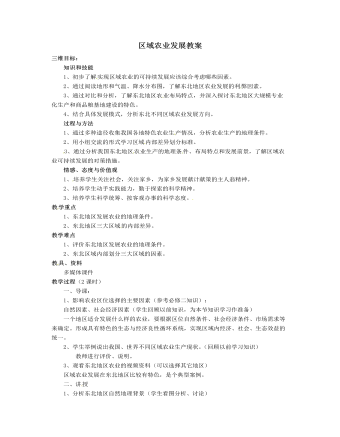
人教版高中地理必修3区域农业发展教案
1.归纳珠江三角洲发展基塘生产有利的地理条件。珠江三角洲地势低平,河网密布,降水充沛。北回归线从珠江三角洲的北部穿过。珠江三角洲地区发展基塘农业生产有利条件可以结合材料,归纳为三个方面:地形、气候、市场(当地和海外)。2.基塘生产将哪些产业联系起来?哪些副产品(或废弃物)被充分利用起来?这种联系对农村经济发展有什么作用?基塘生产环节将种植业(桑、蔗等)、养殖业(养蚕、养鱼)、工业(丝厂、糖厂)等几种产业紧密的联系在一起。在此环节中,塘泥、蚕沙(蚕屎)、蚕蛹、缫丝、滤泥、蔗叶等副产品被充分的回收利用。养蚕业、蔗糖加工业同塘鱼养殖业紧密结合,作为一种综合的经营,几者之间相互依存、相互促进、扬长补短,有机地循环联系起来。基本上解决了桑、蔗的肥料和蚕、鱼的饲料问题。不仅养蚕、蔗糖加工和养鱼生产稳定,而且成本也大大降低。
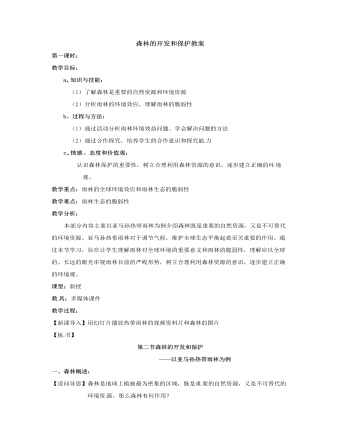
人教版高中地理必修3森林的开发和保护教案
角色扮演:学生扮演政府官员、热带丛林土著居民、 世界环保组织官员、开发商等角色,从角色的立场讨论亚马孙河流域热带雨林的开发活动规则: 每个小组认领一种角色,用5分钟的时间讨论和整理思路,然后推荐一位代表做中心发言,小组的其他同学可以随时补充。发言时请说 明所扮演的角色,尽可能多的发表建设性意见。如果需要,可以上台展示材料【学生互动】 风云辩论:雨林破坏谁之错?正方观点:雨林破坏,亚马孙地区 的国家和 居民应负主要责任反方观点: 雨林破坏,发达国家应负主要责任 【师生小结】 雨林的开发,既有发展中国家经济的需要,也有发达国家国际市场的牵动。保护雨林,是全人类的共同责任,尤其发达国家应该承担更多的责任。保护亚马逊雨林符合长远利益和全球利益。但这与雨林所在地国家的发展产生了矛盾,如何解决之一矛盾是雨林开发与保护的关键。【过渡承转】 绿色和平组织警告说,如果不采取有效措施制止对森林的破坏,80年内热带雨林可能完全从地球上消失。开发还是保护?这是雨林的两种前途,也
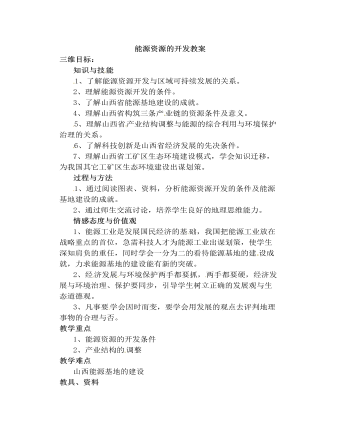
人教版高中地理必修3能源资源的开发教案
知识与技 能 1、了解能源资源开发与区域可持续发展的关系。2、理解能源资源开发的条件。3、了解山西省能源基地建设的成就。4、理解山西省构筑三条产 业链的资源条件及意义。5、理解山西省 产业结构调整与能源的综合利用与环境保护治理的关系。6、了解科技创新是山西省经济发展的先决条件。7、理解山西省工矿区生态环境建设模式,学会知识迁移,为我国其它工矿区生态环境建设出谋划策。过程与方法 1、通过阅读图表、资料,分析能源资源开发的条件及能源基地建设的成就。2、通过师生交流讨论,培养学生良好的地理思维能力。情感态度与价值观1、能源工业是发展国民经济的基 础,我国把能源工业放在战略重点的首位,急需科技人才为能源工业出谋划策,使学生深知肩负的重任,同时学会一分为二的看待能源基地的建 设成就,力求能源基地的建设能有新的突破。
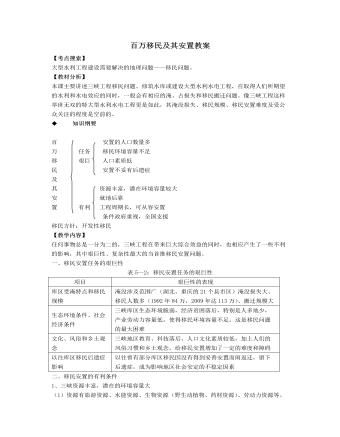
人教版高中地理选修2百万移民及其安置教案
三峡库区农村移民安置根本出路是通过发展大农业来解决耕地不足,不应盲目开垦荒坡地,防止产生新的水土流失,尽量避免生态环境恶化。2、就地后靠,就近安置模式三峡库区淹没区线状分布的受淹特点有别于一般水库淹没区的片状分布,使得库区移民具有相对分散的特点,且淹没涉及的356个乡镇没有一个被全淹,甚至全淹的村也很少,这有利于移民在本县甚至本乡就近后靠安置,避免了水库移民大量外迁、远迁所造成的种种困难和后遗症。三峡移民搬迁大多可以就地后靠,就近安置,这是三峡移民的一大特色。就近后靠安置的优点是不离本乡本土,移民容易接受,且避免了移民大量外迁、远迁所造成的困难和后遗症;缺点是容易对当地的生态环境造成过大的压力,如过度开垦坡地、破坏植被、加剧水土流失等。3、工程周期长,可从容安置移民三峡工程建设周期长(1994年~2009年,共17年),使得移民安置能够及早进行,可以从容安置移民的生产和生活。
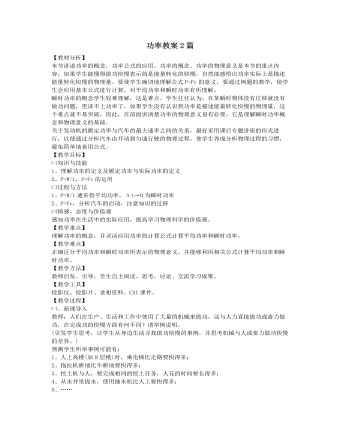
人教版新课标高中物理必修2功率教案2篇
1.用CAI课件模拟汽车的启动过程。师生共同讨论:①如果作用在物体上的力为恒力,且物体以匀速运动,则力对物体做功的功率保持不变。此情况下,任意一段时间内的平均功率与任一瞬时的瞬时功率都是相同的。②很多动力机器通常有一个额定功率,且通常使其在额定功率状态工作(如汽车),根据P=FV可知:当路面阻力较小时,牵引力也小,速度大,即汽车可以跑得快些;当路面阻力较大,或爬坡时,需要比较大的牵引力,速度必须小。这就是爬坡时汽车换低速挡的道理。③如果动力机器在实际功率小于额定功率的条件下工作,例如汽车刚刚起动后的一段时间内,速度逐渐增大过程中,牵引力仍可增大,即F和v可以同时增大,但是这一情况应以二者乘积等于额定功率为限度,即当实际功率大于额定功率以后,这种情况不可能实现。
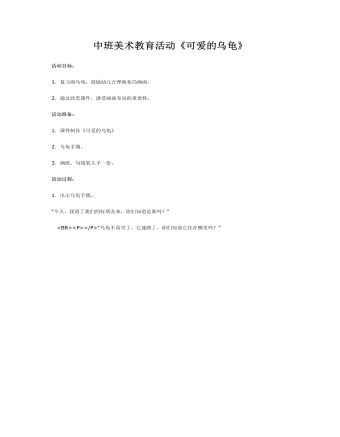
中班美术教育活动《可爱的乌龟》课件教案
2.通过欣赏课件,感受画面布局的重要性。活动准备:1.课件制作《可爱的乌龟》2.乌龟手偶。3.画纸、勾线笔人手一份。

